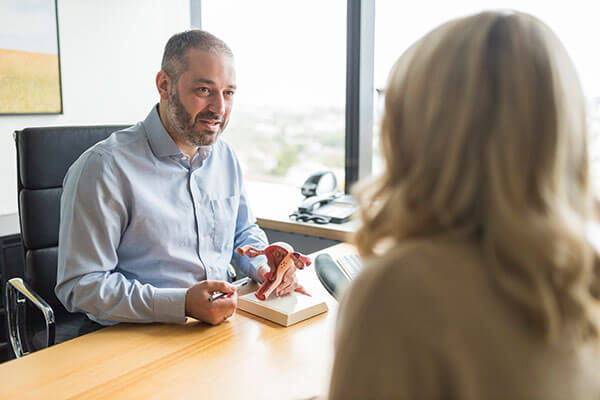Fibroid Treatment Melbourne
Uterine Fibroids, Fertility, and Pregnancy
While fibroids are relatively common in women of reproductive age, most people with fibroids are able to conceive naturally and go on to have straightforward pregnancies. If problems do arise, they may affect fertility, complicate pregnancy, or both, depending on the size, number, and location of the fibroids.
What is a Fibroid Specialist For?
Fibroids on the wall of the uterus may lead to pressure, abnormal bleeding, severe pain, and high fertility risks. For pregnant women, fibroids may cause more than minor clinical symptoms — they may pose a critical risk for labour complications and other consequences. A fibroid specialist aims to remove fibroids, treat fibroids, and offer a more precise diagnosis to guide your ongoing health needs.
As an Advanced Laparoscopic Surgeon, Dr. Hugo is a specialist who offers minimally invasive surgery and procedures to remove fibroids. This includes keyhole surgeries such as laparoscopic myomectomy and hysterectomy. However, surgery is only presented as an option when necessary. Your specialist will help you better understand the conditions around fibroids and find a treatment method that suits your personal preferences and individual health needs.

The Relationship Between Fibroids and Fertility
Patients with fibroids who have difficulty conceiving typically present with either never having had a natural pregnancy, recurrent failure of embryo implantation at IVF, or recurrent miscarriages. As fibroids occur in many sizes and in different uterine locations, including along the uterine wall, we think there are several reasons why these patients have difficulty.
Mechanical Issues
Submucosal fibroids that are pedunculated (on a stalk) or quite prominent in the uterine cavity appear to irritate the lining/cavity by acting as a ‘foreign body’.
Anatomical Issues
Fibroids near the cervix may compress the canal and decrease the number of sperm that enter the uterus.
Submucosal and intramural (in the walls) fibroids distort the shape of the cavity, decreasing the area available for implantation. They also interfere with the natural ‘micro-contractions’ in the uterine walls that help transport sperm high into the cavity.
Fibroids near the tubes may block them or impair their function, preventing sperm from travelling toward an egg and/or an embryo from travelling back to implant in the uterine lining.
Physiological Issues
The cells in fibroids, and fibroid growth appear to produce proteins that may affect the ability of the placenta to continue growing, leading to miscarriage.
Concerned that fibroids could be affecting your health and fertility?
Book an appointment with Dr Hugo for a common diagnostic test.
How a Fibroid Specialist Can Help
Future fertility is the most important factor when deciding how best to manage symptoms associated with fibroids. While treatment is not always necessary, some treatments are contraceptive, and others affect a patient’s fertility altogether. A fertility specialist who regularly manages both fibroids and fertility is best placed to review each case individually and balance a patient’s needs. Generally, these are:
- Current Fertility Issues: Patients with fibroids where there has been difficulty conceiving, or issues with pregnancies (previous prematurity, miscarriages).
- Future Fertility: Patients who are symptomatic of their fibroids and require treatment, but who want to preserve fertility for the future.
Your Fibroid Questions Answered
How do fibroids impact pregnancy?
How do I decide on the best treatment for me?
Can fibroids be treated during pregnancy?
Pain from rapid fibroid growth (red degeneration) may be managed with painkillers that are often required for the remainder of a pregnancy. Surgical removal of a fibroid during pregnancy is very rare because of the high risk to both mother and baby, and treatment should almost always be delayed until after birth. As fibroids often shrink in the three to six months following pregnancy, symptomatic fibroids may improve to the point of not needing treatment or may be managed with less invasive procedures.
Can I still have children?
A specialist in fibroids and fertility will investigate, exclude, and manage all these issues at once, and provide you with a tailored plan to improve your fertility.
Can my fibroids and fertility be treated together?
How can fibroids affect my period?
Why See Fibroid Specialist, Dr Hugo?
Exceptional Care
Patients often visit a gynaecologist for issues that are very personal and private. With Dr Hugo’s experienced team, you can trust that you will receive gynaelogical services that are based on proven treatments and delivered with care tailored to your unique needs.
Personalised Services
While Dr Hugo is an Advanced Laparoscopic Surgeon, specialising in minimally invasive surgery and procedures such as laparoscopic hysterectomy and myomectomy, you can be assured that these are only offered when necessary. Your care is always personalised and you will have a say in treatment and what you’re comfortable with every step of the way.
Combined Treatment Options
If fertility is a concern, Dr Hugo is uniquely equipped to help. As a surgeon and fertility specialist, he aims to actively treat both your uterine fibroids and fertility at the same time. Care may be managed through his own state-of-the-art unit, Newlife IVF, so that you don’t waste precious time or need to move between different specialists and offices.
Your Patient Journey
Referral
To receive a Medicare rebate, you’ll need a referral letter from your GP or another specialist. This also allows me to communicate with your GP or health team.
Book Appointment
I consult mainly from my rooms at Epworth Richmond, but there are also appointments available in Coburg and Warragul. Please call, or book online.
Before Appointment
We will email you a link to a thorough online health and fertility questionnaire. This allows us to spend more time concentrating on your fertility concerns at your first appointment.
First Appointment
I review your health and fertility questionnaire and any results before you attend. At this consultation, I’ll take a thorough history and possibly order further investigations. We’ll discuss the potential issues, and you’ll have an honest assessment of your fertility and possible treatments, including success rates and the pros and cons of each. This appointment will take around 30-45 minutes.
Review Appointments
Further review may be needed to discuss results and your treatment options. As all management is personalised, these are scheduled to your unique situation and treatment.
Treatment
Fertility treatment can range from advice about timing to simple medications or even fertility optimising surgery.
Contact Dr Hugo Fernandes to Address Your Health Concerns
& Fertility Specialist Melbourne.
Book an appointment with Dr Hugo today and we’ll find a time to start your journey to better health together.

